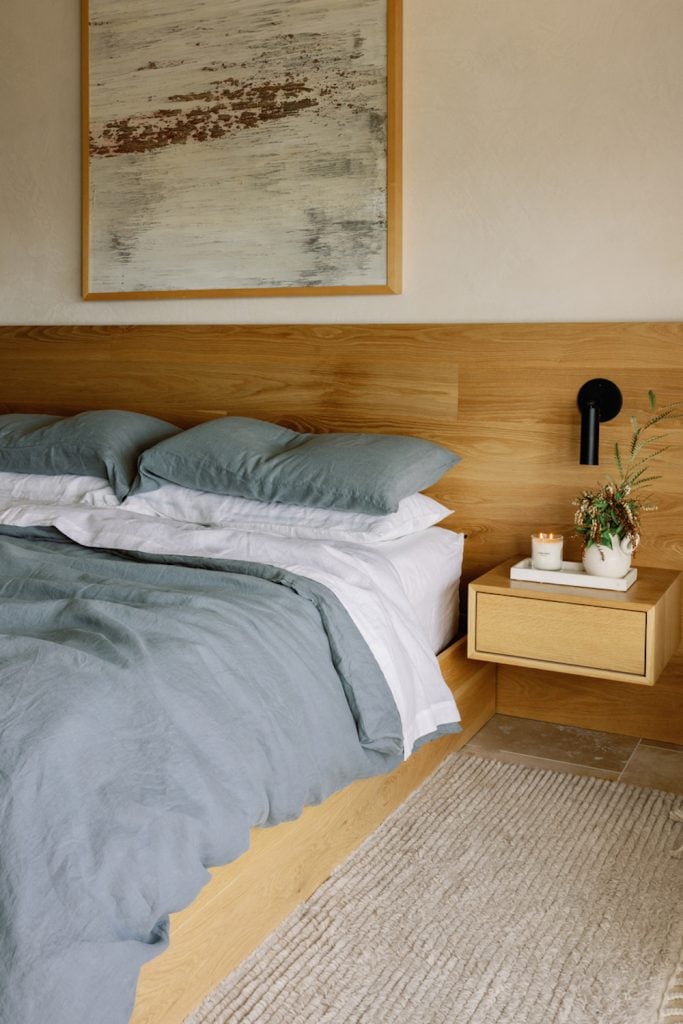In the thick of our fast-paced, modern world, most of us (a whopping 50-70 million!) find ourselves battling sleep disturbances. And these days, it seems a perpetual sense of restlessness wears like a badge of honor. But here’s the thing: your sleep hygiene matters. A lot. Unfortunately, thanks to hustle culture, social media habits, and that irresistible late-night Netflix binge, most of our circadian rhythms are out of whack. Fortunately, the path to better sleep doesn’t begin with chucking your phone and move off-grid (although that sounds peaceful, right?). Instead, it’s time to learn how to reset your circadian rhythm.
In this guide, we’re delving into the science behind circadian rhythms and unveiling practical steps to help you regain control of your sleep. Say goodbye to restless nights and groggy mornings—rediscovering restorative sleep never felt so timely.
Featured image from our interview with Sanetra Nere Longno by Michelle Nash.

What is the circadian rhythm?
The circadian rhythm is our internal biological clock (plants and animals have one too!). It regulates many physiological processes: sleep-wake cycles, body temp fluctuations, hormone production, and even aspects of our metabolism. It functions over the course of roughly 24 hours, and it’s heavily influenced by external cues. Most notably? Sunlight. In other words, think of the circadian rhythm as Mother Nature’s personal timepiece—keeping you in sync with the natural world’s ebb and flow.
Circadian Rhythm and Your Brain
To recap: the circadian rhythm is what makes you feel awake during the day and sleepy at night. But what happens when your internal clock isn’t synced? Inevitably, disruptions (i.e., artificial lighting, travel, an inflammatory diet, etc.) can lead to sleep disturbances. And being sleep deprived leaves your brain exhausted. In turn, your brain can’t function optimally. Short-term, it can impact everything from your cravings to your cognitive function. Long-term, clocking less than seven hours—consistently—can eventually raise the risk of developing Alzheimer’s.

What causes disruptions to your circadian rhythm?
We hinted at them above, but quite a few factors can send your internal clock whirling:
Irregular sleep patterns
Frequent changes in your sleep schedule—such as night shifts, jet lag, or irregular sleep hours—can confuse your internal clock, leading to circadian rhythm disturbances.
Exposure to artificial light
Overexposure to artificial light in the evening (especially blue light emitted by electronic devices!) can signal your body to stay awake and interfere with your natural sleep-wake cycle.
Inadequate natural light
Insufficient exposure to natural daylight—whether due to working in a windowless environment or spending most of your time indoors—can disrupt your circadian rhythm.
Time zone changes
Hello, jet lag. Rapid travel across multiple time zones can confuse your body’s internal clock, making it challenging to adjust to the new local time.
Poor sleep hygiene
Doom scrolling in bed? Chugging coffee late in the afternoon? Engaging in activities that disrupt your sleep hygiene will interfere with your ability to fall asleep.
Stress
Inevitably, high stress levels can impact the quality of your sleep and lead to irregular sleep patterns, which, in turn, can disrupt your circadian rhythm.
Certain medical conditions
Conditions like sleep disorders (sleep apnea, insomnia, etc.), neurological disorders, and mood disorders often impact circadian rhythms.
Environmental factors
Noisy or uncomfortable sleeping environments, extreme temps, and other environmental factors are likely to affect circadian rhythms.

Are you getting too much blue light?
Whether you’ve stayed up late answering emails—or scrolling the ‘Tok—we’ve all spent nights glued to a screen. In turn, we’re bathed in blue light. And blue light can have unique effects on alertness, hormones, and sleep cycles. But where does it come from? Blue light is emitted by LED, fluorescent lights, and most electronic devices.
The issue with too much blue light (especially at night) is that it makes falling asleep very difficult. In fact, recent studies show it can elicit strong melatonin suppression. Not the goal! Some ways to combat blue light exposure: invest in a pair of blue blocker glasses, switch your device to “nighttime mode” after the sun goes down, and use red light therapy in your bedroom.
How to Know if Your Circadian Rhythm Is Off
Oftentimes, it’s obvious. That said, you can tell your circadian rhythm is off by paying attention to two things: your sleep patterns and daily functioning. Signs of a disrupted circadian rhythm include:
- persistent difficulty falling asleep (or staying asleep)
- frequent daytime sleepiness
- fluctuations in alertness
- mood disturbances
- concentration problems
Additionally, do you rely on stimulants—like caffeine—to stay awake? Or need sleep aids to fall asleep? If so, this may indicate a circadian rhythm imbalance.

6 Ways To Reset Your Circadian Rhythm
With all of that in mind, how can you reset your circadian rhythm? Luckily, resetting your internal clock isn’t an insurmountable challenge. Rather, think simple dietary and lifestyle habits that support optimal sleep patterns. And trust—an extra 45 minutes of shut eye goes a long way.
1. Embrace Sun Exposure
Of all the tips, this is foundational. After all, the most potent regulator of our circadian rhythms is natural light. Exposing yourself to sunlight in the morning—and throughout the day—can help reset your internal clock.
Try to spend at least 30 minutes outdoors each morning. If that sounds like an impossible task, break it up into chunks: brush your teeth outside, sip your coffee on your balcony, and go for a 10-15 minute walk. Even when it’s overcast, this counts! Ideally, do this without your sunglasses on. In the evening, also go outside. Eat dinner al fresco or watch the sunset! As the sun sets, it emits higher proportions of red and yellow light, which calm the brain and signal your body clock to prepare for sleep.

2. Limit Artificial Lights
As mentioned, our screens emit a blue light that can trick our brains into thinking it’s still daytime, disrupting our circadian rhythms. To counteract this, reduce screen time at least an hour before bedtime. If you must use screens, consider using blue light-blocking glasses or enabling “night mode” on your devices. Furthermore, tune your home lighting to sync with your circadian rhythm (if this peaks your interest, here’s a great read). We also love using candles and red light therapy to further offset artificial light.

3. Keep Blood Sugar Steady
If your daily eats consist of a constant flow of sugar, you’re likely getting less restorative sleep. In one study, researchers tracked diet and sleep for a group of healthy adults. They found that—indeed—food choices during the day negatively impact sleep. In other words, what you eat can help you fall asleep, stay asleep, and wake up rested. When in doubt, keep blood sugar in check. Prioritize protein (which keeps blood glucose steady) and opt for fiber-rich meals. As far as bedtime snacks are concerned, choose something high in melatonin or tryptophan. Of course, limiting alcohol is key as well.
4. Naturally Increase Melatonin Levels
Speaking of melatonin, naturally increasing this hormone does wonders for your circadian rhythm. After all, it serves as a key regulator of our sleep-wake cycle. In response to decreasing light in the evening, melatonin increases. This surge signals to the body that it’s time to wind down and prepare for sleep. In other words, a healthy release of melatonin—at the appropriate time—contributes to a well-functioning circadian rhythm.
How to increase yours? Eat foods high in melatonin (tart cherries, pistachios, eggs, etc.), maintain a consistent sleep schedule, keep your bedroom dark and cool, and create a relaxing nighttime routine.

5. Optimize Your Sleep Environment
This goes without saying, but your bedroom should be a sanctuary for sleep. Yes, sanctuary. Ensure your sleeping space is dark, quiet, and cool. Invest in an eyemask, earplugs, or a white noise machine if necessary. A comfortable mattress and pillows are also essential for quality sleep! Furthermore, use essential oils—like lavender, ylang ylang, and chamomile—in your bedroom. Aim to keep your phone charged in a different room and use a traditional alarm clock instead.
6. Exercise Regularly
Exercise—like sleep—is a universal healer. And in many ways, it can positively impact your circadian rhythm. Regular physical activity, particularly when done during daylight hours, helps realign your internal clock with the environment’s natural light-dark cycle. Additionally, exercise is a stress-reducer (which can disrupt the circadian rhythm). And no, this doesn’t require daily HIIT. Low-impact exercise, including walking, is fantastic.
Overall, incorporating exercise is a win-win: it enhances physical health, balances blood sugar, and contributes to a well-functioning circadian rhythm. The result? More restorative sleep patterns.






